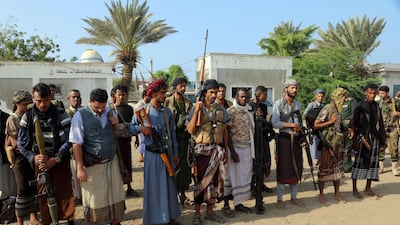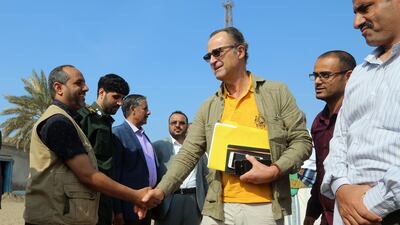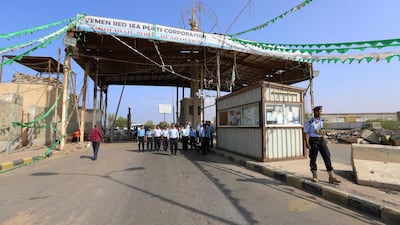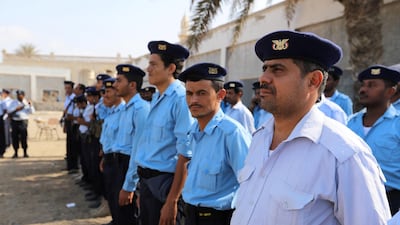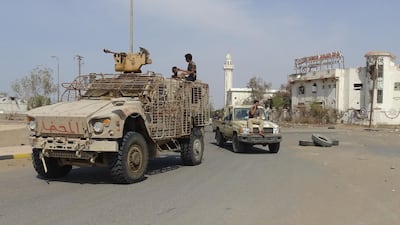Yemen's Houthi rebels have handed over control of Hodeidah port, UN and rebel officials said on Saturday, in a major step towards implementing a ceasefire agreement.
A UN source said the Houthi forces, which control Hodeidah city and its strategic port, had started to redeploy overnight.
"Our forces have started to redeploy since last night from Hodeidah port, as agreed in Sweden," a Houthi military spokesman told the group's Al Masirah TV.
Residents of Hodeidah confirmed to The National that the Houthis had started to withdraw and said rebel checkpoints on the route to the port were removed on Saturday.
The rebels and government agreed to implement a ceasefire in Hodeidah and withdraw their respective forces from the province after talks in Sweden this month.

Retired Dutch general Patrick Cammaert, the head of a United Nations advance team charged with monitoring the ceasefire, arrived in Hodeidah this week.
Hodeidah's Houthi governor, Mohammed Ayash Qaheem, told Reuters that the group's fighters had withdrawn from the port as specified in the peace agreement, handing control to local units of Yemeni coast guards who were in charge of protecting ports before the war. These will be under UN supervision.
However, the Yemeni government officials and coalition sources have warned that the Houtih's may have been staffing the coast guard and other civilian authorities with fighters and loyalists in a bid to maintain control of the port city after they officially withdraw.
Military officials from the government forces, which control some southern parts of the city of Hodeidah, said they needed time to establish if the Houthi forces had really withdrawn from the ports.
"They may be just replacing their men with others from the so-called coast guard forces," one official said.
Under the deal, international monitors are to be deployed in Hodeidah and a Redeployment Coordination Committee (RCC) including both sides, chaired by Mr Cammaert, will oversee implementation. The committee started its meetings this week.
The Houthis' withdrawal from the province's three ports of Hodeidah, Salif and Rass Issa is intended to be the first step in the implementation of the ceasefire, which came into force on December 18.
______________
Read more:
Yemen government to pay civil servants in rebel-held Hodeidah
Houthi mine threat stops displaced Yemenis returning home
UN committee holds first official meeting on Hodeidah ceasefire
______________
The ceasefire agreement, the first significant breakthrough in peace efforts in five years, was part of confidence-building measures intended to pave the way for a wider truce and a framework for political negotiations.
The international community has been trying for months to avert an all-out government assault on Hodeidah, the entry point for most of Yemen’s commercial goods and aid supplies, and a lifeline for millions of Yemenis on the verge of starvation.
On Friday, the UN said both sides had agreed to begin opening humanitarian corridors, starting with the key coastal road between Hodeidah and the Houthi-held capital, Sanaa.
A spokesman for the pro-government Amalikah Brigades told The National that they had opened the route on Friday.
"Our forces immediately opened the Kilo 16 road and cleared the Houthi landmines planted on it to allow relief convoys to reach to Sanaa and the other provinces northern Yemen, according to the agreement with the head of the RCC Patrick Cammaert," Col Wathah Al Dubaish said.
Aseel Al Sakladi, director of the Amalikah Brigades media centre, said the rebels fired two Grad rockets at the government forces as they were de-mining and clearing route.
After the rebels withdraw from the ports, the next stage of the ceasefire requires both sides to pull their forces out of Hodeidah city and the surrounding province.
It is still not clear how far they will withdraw and who will control the three ports and the city, or if the two sides will share control with UN monitors positioned between the two fronts. The agreement released after the Sweden talks said the city would be policed by neutral government forces.
The United Nations has said Mr Cammaert’s team will not be uniformed or armed, but it will provide support for the management of and inspections at the ports and strengthen the UN presence in the city.
The rebels and government are due to present detailed plans for a full redeployment to Mr Cammaert at the next RCC meeting on January 1, the United Nations said.
Meanwhile, a prisoner exchange agreed upon in Sweden as another confidence-building measure has hit a snag, a government official told The National.
The rebels deny holding 2,946 of the 8,576 people on the list of prisoners whose release the government is seeking, according to the official.

